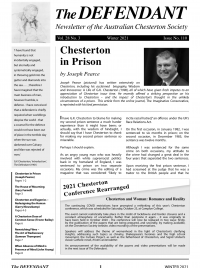
Joseph Pearce (pictured) has written extensively on Chesterton, including his acclaimed biography, Wisdom and Innocence: A Life of G.K. Chesterton (1996), all of which have given fresh impetus to an appreciation of Chesterton in our time. He recently offered a striking perspective on his introduction to Chesterton – and the impact of Chesterton’s thought in the unlikely circumstances of a prison. This article from the online journal, The Imaginative Conservative, is reprinted with his kind permission.
I have G.K. Chesterton to blame for making my second prison sentence a much harder experience than it might have been; or actually, with the wisdom of hindsight, I should say that I have Chesterton to thank for making my second prison sentence so miserable.
Perhaps I should explain.
As an angry young man who was heavily involved with white supremacist politics back in my homeland of England, I was sentenced to prison on two separate occasions. My crime was the editing of a magazine that was considered “likely to incite racial hatred,” an offence under the UK’s Race Relations Act.
On the first occasion, in January 1982, I was sentenced to six months in prison; on the second occasion, in December 1985, the sentence was twelve months.
Although I was sentenced for the same crime on both occasions, my attitude to the crime had changed a great deal in the four years that separated the two sentences.
Upon receiving the first prison sentence, I had screamed at the judge that he was a traitor to the British people and that he would soon face his own judgment. I needed to be dragged from the courtroom as I unleashed my venomous invective against the one who had condemned me.
I considered myself a political prisoner, as did the IRA sympathizer in the next cell who had been imprisoned for slashing a painting of Princess Diana. I was not like the common criminals who surrounded me. I was a martyr for the cause of white supremacy and national liberation. I had forsaken my
freedom for my nation’s freedom. I was not only a political prisoner but a political soldier who used my time in prison to get myself in physical shape so that I could be a better fighter for the cause upon my release.
Armed with such feelings of self-justification and self- righteousness, I cruised through the first sentence, counting down the days until my release so that I could return to the fray and let myself loose once more upon the multiracial society that I despised.
A different person – no longer hero or martyr
It was a very different person who sat alone in his cell at the beginning of the second sentence, a person who looked with gloom and despondency at the twelve-month chasm that stretched out before him in a seemingly interminable distance of endlessly protracted days.
I was that person: a person who would have been unrecognizable to his earlier self, a person who was no longer certain of the cause for which he had been condemned, a person who doubted himself as he doubted the ideology that had sustained him.
I no longer felt like a hero or a martyr. Instead, I saw myself as a pathetic wretch who had been going through the motions, playing a part, faking it, playing to the gallery. I was one who was stuck in the rut I had dug for myself, a rut that was itself a prison because I hadn’t the courage to climb out of it.
In such a broken state, and in such a frame of mind, the second prison sentence was much more difficult. And it was largely the fault of a certain Gilbert Keith Chesterton.
Once again, I should explain.
I had started to read Chesterton several years earlier, even though I despised his Catholicism. I was almost rabidly anti-Catholic, being a member of a quasi-masonic, anti- Catholic secret society called the Orange Order. Nothing
would get me to read a Christian book of any sort and a Catholic book least of all.
So why had I started reading Chesterton? I had been persuaded to read his essay on economics, a subject that interested me greatly, and had subsequently read his book on economics, The Outline of Sanity. His political and economic creed, which he and his friend Hilaire Belloc called Distributism, had a radical impact on my understanding of the world, offering a healthy and viable alternative to the twin evils of communism and capitalism, both of which I despised.
Chesterton as a friend
Furthermore, I began to like Chesterton as a friend, even if I still disagreed with his religious beliefs. It was as though he leapt out of the page when I read him. He was a real personality and not merely a conveyer of ideas.
My experience was similar to that described by C.S. Lewis when he had first read Chesterton. Lewis could not understand why Chesterton had made such an “immediate conquest” of him.
“It might have been expected that my pessimism, my atheism, and my hatred of sentiment would have made him to me the least congenial of authors.” Thus wrote Lewis and thus might I have written also. Lewis and I were both prejudiced against Catholicism and yet we couldn’t help liking Chesterton.
Lewis likened it to the bringing of two minds together and even to “falling in love.” He liked Chesterton’s rambunctious senseofhumour,asdidI,andChesterton’s“goodness”—“which had nothing to do with any attempt to be good myself.”
Like Lewis, I was attracted to the goodness in Chesterton, even though I had no real desire to emulate his life of virtue. The attraction that Lewis and I felt towards Chesterton was the attraction that people feel towards the saints, even though they are themselves miserable sinners.
“In reading Chesterton,” Lewis wrote, “I did not know what I was letting myself in for. A young man who wishes to remain a sound Atheist cannot be too careful of his reading.”
As with Lewis, I recognize Chesterton as a guide who led me from the doldrums of disbelief into the glorious light of the Gospel. Unbeknownst to me, the gloom in my prison cell was the gloaming of a new day in which the Son would rise, Easter-like, in my soul.
It is for this great gift that I thank Chesterton for making me so miserable in those first days of my second prison sentence. The debt I owe to him is unpayable.
